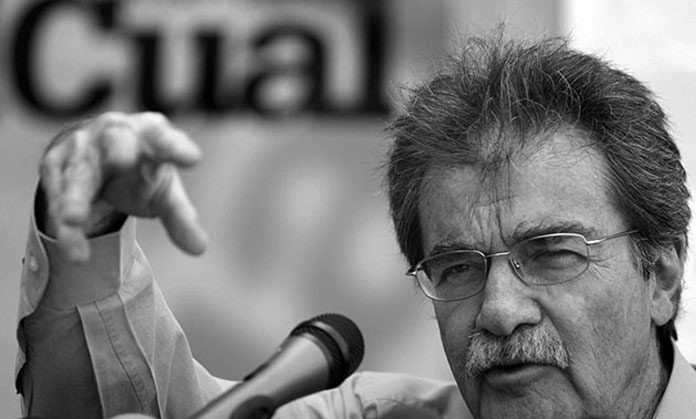Teodoro and FDR
 Espacio Publico / Flickr / CC BY-NC-SA 2.0
Espacio Publico / Flickr / CC BY-NC-SA 2.0
On a sunny Saturday in early 2009, shortly after Barack Obama became president, I had breakfast with Teodoro Petkoff in Washington, DC. Petkoff was a good friend and one of Latin America’s intellectual giants, who died this week at 86 in his native Venezuela. He was an utterly delightful character – passionate, incisive and iconoclastic – with a restless and fertile mind. His trajectory from guerrilla to politician to planning minister to journalist mirrored the evolution of the democratic left in Latin America.
I was curious to know Petkoff’s impressions of Obama. He said he liked and admired him but, while clenching his fist, added, “pero le falta fuerza” (but he lacks strength), “I was hoping he’d be another FDR. He is not.” That prompted a long conversation about FDR until Petkoff told me, “he was my hero – for his courage, convictions, and commitment to social justice.”
I mentioned that the FDR memorial was one of my favorite monuments in DC. When he said he had never seen it, I suggested the two of us go together to the Tidal Basin to visit. Upon entering the magnificent memorial, Petkoff was awestruck. He caressed the bronze sculptures of FDR and got up close to soak in every word, evincing a near child-like enthusiasm. He was spellbound. Several times he read the eloquent, engraved phrases of the former president and remarked that Chavez, who had become Venezuela’s leader a decade earlier, once had an opportunity to say and act on those words and bring Venezuelans together, perhaps for a “rendezvous with destiny.” Petkoff said Venezuela needed an FDR-like change, a call for national unity and a New Deal. Petkoff gave Chavez credit for elevating the social agenda, but lamented that the Venezuelan strongman was only capable of increasing polarization and bitterness and destroying the country.
Those few hours spent with Petkoff that day gave me further insight into what made him tick. The experience remains etched in my memory. The steps taken along a such a rich life and fascinating political journey made perfect sense in light of the FDR inspiration. The rest flowed naturally.
Petkoff was a quintessential maverick, fair-minded, and often a lone voice, occupying a unique space in such a polarized society. While he sharply criticized Chavez, always stressing his authoritarian tendencies – in contrast to more democratic leftist currents in Latin America – Petkoff was unsparing with Venezuela’s opposition. He accused a number of opposition figures of being blind to Venezuela’s profound societal changes and wanting to somehow restore the pre-Chavez era. In 2008, after a lunch I attended with Petkoff and some opposition figures, he turned to me and said, with characteristic bluntness, that most of the guests at the table were “irrelevant.”
For analysts attempting to track and fathom the evolution of Chavismo over the past two decades, Petkoff was an indispensable guide. His columns in Tal Cual (“Like it is”), the independent newspaper he edited and founded in 2000, were obligatory reading. They were trenchant, written with a refreshing directness and without guile. When Petkoff became ill a few years ago and stopped writing, one felt a real void and wondered what he would say in response to developments. Not surprisingly, though, he was a mentor to many Venezuelans who were inspired by his example and have sought to follow his path.
No one was more brilliant, independent, and generous with his ideas than Teodoro Petkoff. He was a consummate public intellectual with enormous integrity and a keen sense of irony who one never tired of listening to and learning from. He enriched and uplifted so many lives.
Will we see his likes again, in Venezuela or elsewhere? Frankly, I have my doubts.



















